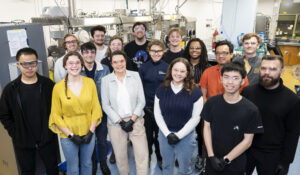The SALT Research Group

SALT Lab, led by nuclear engineering professor Raluca Scarlat, at UC Berkeley’s Etcheverry Hall in Berkeley, Calif. on Monday, Feb. 26, 2024. (Photo by Adam Lau/Berkeley Engineering)
SALT || Reactor Safety & InorgAnic Chemistry of Light Elements at High Temperature
We apply our research to fluoride-salt-cooled high-temperature reactors (FHRs) and Molten Salt Reactors (MSRs), high-temperature gas cooled reactors (HTGRs), and tritium-breeding blankets for fusion systems. Our research includes safety analysis, licensing and design of nuclear reactors, and extends to engineering ethics.
Open positions and involvement with the group
- Graduate students: the UC Berkeley Nuclear Engineering Ph.D. Program Application is due mid- December.
- Postdoctoral positions open in the following areas: salt chemistry | materials | graphite | corrosion | electrochemistry. Please email Prof. Scarlat: scarlat@berkeley.edu
- Lab tours and general inquiries about the work in the SALT group: Please email Prof. Scarlat: scarlat@berkeley.edu
Research
A. We are part of the following multi-institute research consortia:
- Bridging the gap between experiments and modeling to improve design of molten salt reactors NEUP IRP. Funding agency: NEUP. 2022-2025.
- Reduction, Mitigation, and Disposal Strategies for the Graphite Waste of High Temperature Reactors NEUP IRP. Funding agency: NEUP. 2022-2025.
- UPWARDS: Universal Performance Criteria and Canister for Advanced Reactor Waste Form Acceptance in Borehole and Mined Repositories Considering Design Safety Funded by: DOE ArpaE. 2022-2025.
- NSSC: Nuclear Science and Security Consortium. Funded by: NNSA. 2021-2026.
- MINES: The Science of Direct MINeral to Energy Storage Synthesis. Funded by: DOE BES Critical Minerals and Materials. 2022-2026.
- FUTURE: The Fundamental Understanding of Transport Under Reactor Extremes. Funded by: DOE BES Materials Science and Engineering. 2022-2026.
- Molten Salt Loop for the MIT Reactor NEUP IRP. Funded by: NEUP. 2020-2023.
- Artificial Intelligence Institute for Advances in Optimization (AI4OPT). Funded by: NSF. 2021-2026.
B. Other projects that are not part of large research consortia:
- High Temperature Molten Salt Studies. Funded by: France-Berkeley Fund. 2021-2022. Collaborators: Sylvie Delpech (Université Paris, Orsay). Topics: molten salt electrochemistry, reference electrode development.
- Probing Speciation of Light Elements in Molten Salts by Electrochemistry, High Temperature Liquid NMR, and Neutron Diffraction. Funded by: DOE NEUP. 2021-2024. Collaborators: B. Kaykovich (MIT), S. Vogel (LANL), M. Asta (UCB), I. Farnan (University of Cambridge).
- High Temperature Molten Salt Reactor Pump Component Development and Testing. Funded by: DOE NEUP. 2021-2024. Collaborators: M. Anderson (UW, lead PI), N. Zweibaum (Kairos Power), J. Hensel (Powdermet), K. Robb (ORNL). Topics: tribology in molten salt, sensors for pump health monitoring.
- ThorCon Loop Corrosion Studies. Funded by: Thorcon Power. Topics: salt properties, corrosion performance of SS316H in a molten salt loop.
- Thermodynamics Textbook: Creating Culturally and Historically Diverse Examples. Funded by: UC Berkeley College of Engineering Advancing Faculty Diversity in Berkeley Engineering.
- Graphite and Tritium Studies in Molten Fluoride Salts
- Molten Salt Round Robin 1.0
In the News: Radio, Television, and Online Videos
- Diablo Canyon Nuclear Power Plant Independent Safety Committee (DCISC) Appointment. September 2025.
- A new toxic metal has been found in the air after L.A. Fires. No one knows where it’s coming from. San Francisco Chronicle. July 2025.
- Nuclear power renaissance. Reinventing energy systems via molten salt technologies. Berkeley Engineer Magazine. November 2023.
- U.S. Department of Energy Nuclear Energy Advisory Committee (NEAC) Appointment. February 2022.
- Molten-Salt and Salt-Cooled Nuclear Reactors: The Opportunities and Challenges Faced in Providing a Global Solution to Clean Energy. Center for International Security and Cooperation (CISAC) Stanford University. October 31, 2019.
- Nuclear Technology: Opportunities and Hurdles in Research and Development. Wisconsin Public Radio, NRP. The Larry Meiller Show. October 8, 2018.
- Designing the Next Generation of Nuclear Reactors. June 6, 2018. Wisconsin Public Television, PBS. University Place.
- Thermochemistry of Molten Salt Solutions. Thorium Energy Alliance Conference. August 21, 2017